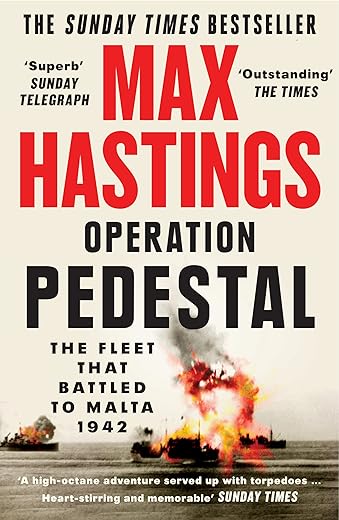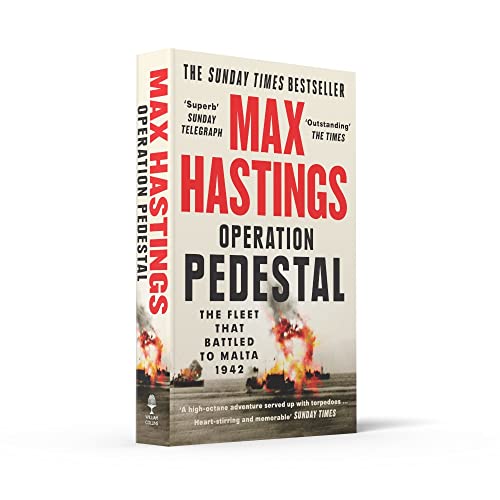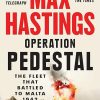Operation Pedestal: A Times Book of the Year 2021
£8.70£9.50 (-8%)
The Sunday Times bestseller
‘One of the most dramatic forgotten chapters of the war, as told in a new book by the incomparable Max Hastings’ DAILY MAIL
In August 1942, beleaguered Malta was within weeks of surrender to the Axis, because its 300,000 people could no longer be fed. Churchill made a personal decision that at all costs, the ‘island fortress’ must be saved. This was not merely a matter of strategy, but of national prestige, when Britain’s fortunes and morale had fallen to their lowest ebb.
The largest fleet the Royal Navy committed to any operation of the western war was assembled to escort fourteen fast merchantmen across a thousand of miles of sea defended by six hundred German and Italian aircraft, together with packs of U-boats and torpedo craft. The Mediterranean battles that ensued between 11 and 15 August were the most brutal of Britain’s war at sea, embracing four aircraft-carriers, two battleships, seven cruisers, scores of destroyers and smaller craft. The losses were appalling: defeat seemed to beckon.
This is the saga Max Hastings unfolds in his first full length narrative of the Royal Navy, which he believes was the most successful of Britain’s wartime services. As always, he blends the ‘big picture’ of statesmen and admirals with human stories of German U-boat men, Italian torpedo-plane crews, Hurricane pilots, destroyer and merchant-ship captains, ordinary but extraordinary seamen.
Operation Pedestal describes catastrophic ship sinkings, including that of the aircraft-carrier Eagle, together with struggles to rescue survivors and salvage stricken ships. Most moving of all is the story of the tanker Ohio, indispensable to Malta’s survival, victim of countless Axis attacks. In the last days of the battle, the ravaged hulk was kept under way only by two destroyers, lashed to her sides. Max Hastings describes this as one of the most extraordinary tales he has ever recounted. Until the very last hours, no participant on either side could tell what would be the outcome of an epic of wartime suspense and courage.
Max Hastings’ book ‘Abyss’ was a Sunday Times bestseller w/c 15-05-2023.
Read more
Additional information
| Publisher | William Collins (12 May 2022) |
|---|---|
| Language | English |
| Paperback | 464 pages |
| ISBN-10 | 0008364982 |
| ISBN-13 | 978-0008364984 |
| Dimensions | 12.9 x 3.1 x 19.8 cm |












by Tony617
I’ve purchased every book written by Max Hastings since his seminal The Battle for the Falklands, and this is the first I’ve been disappointed with.
In the introduction he says that the story of Operational Pedestal has been neglected, but I would dispute that. Just a month after the PQ17 disaster, the RN (and Merchant Marine) gambled all on ‘Malta’, and had its finest hour in WW2 – excluding campaigns such as the Battle of Atlantic it is the one instance where the RN (and Merchant Navy) almost alone fought a Battle that had a clear and direct influence on the course of the war. The failure of Pedestal and the subsequent surrender of Malta would have been a catastrophe that made the loss of Force Z in Dec 1941 seem just a slightly unfortunate event for the British Empire. The lengthy (and not complete) bibliography shows that Sir Max is hardly the first historian in recent years to recognise the importance of the convoy.
When I try to understand why the book is disappointing compared to his previous books, there are several clear reasons. (1) He has not been able to interview any participants in the events described, they are sadly now all deceased. (2) He has not been able to include any significant new information. (3) He has not bought a new /fresh/revisionist/thought-provoking perspective to the battle.
In the introduction he admits to a reliance on “testimony given by Pedestal survivors to 20th – and early 21st – authors”, and the extensive use of secondary sources is self-evident and very unusual compared to his other works. To fair, he is clearly aware of the problem as the first sentence of the section Acknowledgements states “Some wit observed that to borrow from one source is plagiarism, while to borrow from many is research”.
Hopefully Sir Max will now avoid the almost overly documented WW2, and either look at more recent events or perhaps put his almost unrivalled knowledge and analytical skills to work on 19th century campaigns.
by Tim H
As my father was on the Indomitable, I was drawn to reading this asap. I am very impressed by the research that has been carried out and the detail of participants actions on both sides and at all levels makes the account both readable and gripping. I was tempted to give it top rating but though I like the conclusions, I felt that in the earlier parts of the book I was being given a little to much opinion as fact rather than being presented arguments that would enable me to come to my own conclusions. I nevertheless highly recommend this book to anyone interested in this critical period of history.
by Andrew
A nail biting account of ‘Opertation Pedestal’ by Max Hastings who manages to provide his often insightful analysis of the success and failures of such militray conflicts.
by Jeremy Robert Davies
Extraordinary story told with balance and objectivity that also underlines the true heroism of its participants. The best account written so far.
by Adam J.
I should perhaps start by saying that I much enjoy Sir Max Hastings’ military histories, of which I have almost a dozen in my study, and I must confess to liking this latest offering. It is a fast-paced and gripping account of what was, in my personal opinion, the critical naval battle in the Mediterranean Theatre in World War II [pace those members of the Fleet Air Arm who would propose Taranto or Cape Matapan]. That said, the book reads like an article in a popular newspaper, although I suspect that his writing style owes much to Sir Max’s journalistic background.
However, his views, as expressed in this volume have a continued a somewhat ‘revisionist’ trend in his writings (which was already apparent in some of his earlier books, such as ‘Chastise’), which is accompanied by what seem to me to be what can only be characterised as ‘socialist’ (perhaps that should read ‘populist’) views; as evidenced by his frequent denigration of senior British commanders, largely I would contend, on the basis of critical accounts supplied by very junior Royal Naval and Merchant Naval personnel.
As a former Royal Naval Officer, I studied Operation Pedestal during my initial training at BRNC Dartmouth and again, somewhat later, while attending the Senior Staff Course at RNC Greenwich and have read about it extensively in the succeeding years. Furthermore, having served in the Type 42 destroyer HMS MANCHESTER in the 1980’s, I am fully conversant with the fate in 1942 of its unfortunate predecessor; having met in person [on ‘Old Manchesters’ Day] almost a hundred of the ship’s company who served in that WW2 vessel.
To me, Sir Max also appears ambivalent about which side won the battle, whereas I am confident that, despite its severe losses, the Royal Navy came out on top. I would assert this because Operation Pedestal achieved its aim, which was to resupply Malta sufficiently to enable the island to sustain itself until the Battle of El Alamein and Operation Torch [both of which were already foreseen as Pedestal was being planned and mounted] transformed the strategic situation in the Mediterranean.
The above relatively minor criticisms aside, I would recommend this volume to any serious student of naval history; not least for the photographs, quite a few of which were new (to me at least). However (admitting that this is a personal bugbear), the book would be improved by the addition of more detailed charts – one say for each of the critical days of the fight [i.e. 11 to 13 August inclusive] – showing as a minimum the extent of the Axis minefields, the tracks of the merchant ship “stragglers” and “rompers” and the radii of action of the British and Axis bomber and fighter aircraft.
In light of the foregoing, I feel that I should award ‘Pedestal’ four stars, not five.
by Daniel
Very well written and interesting book. Dives into various sketches of submariners, pilots, merchantmen, seamen and gives a very personal account of each. If I had any criticism it’s a bit relentless in its vignette style so you sometimes lose perspective of where you are and what is happening in wider context. This would be easily fixed with a few more of the clear diagrams. Otherwise a great book.
by Chris ramsay
Excellent telling of important battle
by JAnderson thought the book a broad brush approach.lacked detail
Obviously well researched. A wealth of information. Perhaps to much detail about individuals which made reading a bit tedium at times. Perhaps a summary periodically to indicate where the convoy was, how many ships still there. Merchant and support vessels . How far to go and prospects ahead. However a good read indicating the heroic efforts to supply the George Cross Island.